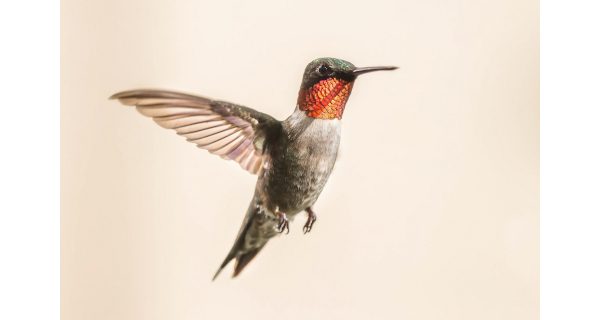'I have a local resident through which you can live vicariously this summer: the ruby-throated hummingbird.'
By Stephen Press
Hometown Weekly Editor
Social distancing and quarantining were always going to be difficult.
It was far easier to stomach, though, during the gray, unappealing March and the raw, often-muddy April.
Now it’s beautiful outside. Leaves are on the trees. Flowers are blooming. Many of us are finding ourselves cooped up indoors, tortured by the thought that we’re missing out on the fun that usually accompanies a New England July.
I have a local resident through which you can live vicariously this summer: the ruby-throated hummingbird.
The basics. Ruby-throated hummingbirds are the only species of hummingbirds that call New England home. They breed and summer here, journeying from and to Central America at the beginning and end of the season, respectively. The striking males are emerald green with an iridescent red throat that looks particularly brilliant in direct sunlight. The females, meanwhile, are a duller gray-green and lack the ruby throat that lends the species its name. Both males and females are tiny - no more than three or four inches long - and can sometimes be confused with a large insect as they zip by.
They’re a bit excessive in their work habits. During the day, hummingbirds are active as all get-go, fueling their off-the-charts metabolism by constantly seeking and consuming flower nectar. So extremely do they burn energy that by night, they need to go into a state of torpor, significantly dropping their heartbeat and body temperature while they sleep; it effectively reduces their overall metabolism to 1/15 of daytime levels. Without doing so, a hummingbird would starve to death overnight.
The upshot of this intense caloric consumption is that while hummingbirds are active, they are intensely energetic - the avian equivalent of an over-caffeinated A-type personality. They are ace fliers whose mobility is second to none among birds, and they utilize it not only to feed, but to attract mates and repel competitors, sometimes to a hilarious extent.
You can find these hyperactive avian acrobats wherever you can find blooming flowers in abundance: the butterfly garden of Walpole’s Adams Farm (right by the border of Westwood), the Gardens at Elm Bank on the Dover/Wellesley line, or the Medfield Rhododendrons would all be fine places to look for them in the wild.
From this writer’s perspective, though, the best way to appreciate them is by setting up a feeder in one’s own backyard. This is also what makes them so ideally suited to pandemic-era observation. Hummingbird feeders abound, both online and in brick-and-mortar outlets, and they’re by no means over-expensive. My feeder of choice is somewhere between $30-$40, depending on where you source it. Preparing homemade “nectar” with which to fill them, meanwhile, is as easy as mixing four parts water to one part refined sugar.
In this backyard context, and with repeated observation, the hummingbirds’ personalities begin to stand out. It’s difficult not to get attached to them as they come and go, engaging in high-speed chases in competition for places at your feeder. So fond does one become of their antics that you notice yourself finding excuses to look out the back window at increasingly closer intervals. In the past, I’d even taken to naming the little guys who frequented my feeder.
The steadfast male who stood sentry on the clothesline, guarding his post with his life? Dunbar, after Kevin Costner’s character in “Dances With Wolves.” The plucky female, refusing to by cowed by larger, stronger hummingbirds at the feeder? Fantine, named after one of the destitute protagonists in “Les Misérables.” Her male companion? Valjean. His nemesis? Javert, of course.
Ridiculous as this all may sound, particularly given the diminutive size of the birds, it’s not an exaggeration to say that these petite visitors can have an outsized effect on one’s level of engagement, and sanity, throughout the season.
Hometown Weekly readers - humanity in general, really - may not be at liberty to enjoy the usual fruits of summer. They ought not sleep, however, on the little pleasures (literally, in this case) that exist outside their back windows.





















